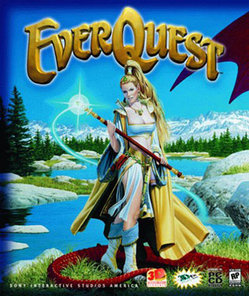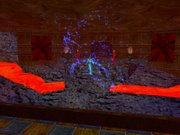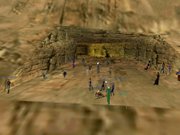Everquest
'EverQuest (EQ) is a 3D fantasy massively multiplayer online role-playing game (MMORPG) released in March 1999. The original design is credited to Brad McQuaid, Steve Clover, and Bill Trost. more...
It was developed by Verant Interactive (which had recently parted from 989 Studios) and published by Sony Online Entertainment (SOE). SOE currently runs and distributes EverQuest.
To play, one must initially pay for the game software and then pay a recurring monthly fee; a free trial is also available for those who wish to experience the game before paying. EverQuest was the most popular MMORPG outside of Asia from 1999 to around 2004, claiming nearly a half-million paying subscribers. EQ has frequently been cited as popularizing the MMORPG genre based on its success and mainstream media attention, which often noted its controversial aspects. It has had numerous expansion packs, a sequel, and other spin-off products.
Overview
In the game, players explore a Tolkienesque fantasy world of sword and sorcery, fighting monsters and enemies for treasure and experience points and interacting with other players. As they progress, players advance in level, gaining power, prestige and abilities. Players can also procure powerful items for their characters in a variety of ways: through slaying monsters (and then looting whatever items they were carrying), doing "quests" (tasks and adventures given by non-player characters ( NPCs ) in which a reward is given upon success), or by gathering raw materials and then fashioning them, via numerous trade skills such as tailoring or blacksmithing, into useful (or not-so-useful, but nevertheless fun) items. In structure and rules, the game is a direct descendant of the famed Dungeons & Dragons role-playing game. Many of the elements from EverQuest have also been drawn from text-based MUD (multi-user dungeon) games, especially DikuMUD.
The game features a rich 3D environment set in the fictional world of Norrath, its moon Luclin and alternate planes of reality. The geography of the EverQuest universe is vast—few have visited all of the nearly 400 zones. Multiple instances of the world exist on various servers, each one hosting between 1000 and 3000 simultaneous players online during peak times. After selecting a server, a player can create multiple characters by choosing from a variety of classes and races (e.g., humans, gnomes, trolls, halflings, elves, etc.). The main aspect of gameplay involves grouping with fellow players to kill monsters for experience and gear. Beyond that, a player can explore the large world, socialize, role-play, join player guilds, master trade skills, and duel other players (in restricted situations — EQ only allows player versus player (PvP) combat on the PvP-specific server, in designated arenas, or in a consensual duel in a limited number of locations.
While some parts of EverQuest can be experienced alone, without the help of other players, EQ generally remains a very group-centric game. A single character will be unable to complete many of the encounters in EverQuest. Most parts of the game can be completed with small groups of up to six or so people, but the most challenging (and rewarding) encounters require the cooperation of many players, possibly totalling 72 players, although the trend in recent expansions tends towards 54 as a maximum. A large force of gamers gathered together to perform one task, is referred to as a "raid". Normally the number of players range from 36 to 72, limiting factors being the maximum number of people allowed in a "raid window" (72) and the maximum number of people allowed in certain instanced zones in more recent expansions. Zerging is when a raid's main strategy is to overwhelm an enemy by sheer force of numbers. As EverQuest has aged, tactics have become more and more involved. Some of the most complex 'modern' raid events can take a very experienced guild dozens of attempts before they succeed. Less skilled guilds may take as many as a hundred tries to beat the same event, if they are able to accomplish it at all, due to the level of strategy and teamwork required to defeat modern EverQuest encounters.
Development
While the original concept is credited to Brad McQuaid, Steve Clover, and Bill Trost, much of the actual design was done by Brian Canary, Ryan Palacio, Roger Uzun and Geoffrey "GZ" Zatkin. Many other people have worked on EQ's design through the many updates and expansion packs that have been released as the service has operated continually since 1999.
989 Studios funded development and initially published the game, before Verant Interactive took management after 989 Studios unilaterally canceled all of its PC projects. Sony Online Entertainment later purchased Verant, and SOE runs and distributes EverQuest currently.
EverQuest launched with some technical difficulties on March 16, 1999 but quickly became successful. By the end of the year, it had surpassed the leading competitor, Ultima Online in number of subscriptions. Numbers continued rising at a steady rate until mid-2001 when growth slowed. As of 2004, Sony reports subscription numbers close to 450,000.
Zones
- For more details on this topic, see Zones of EverQuest.
The EverQuest universe is divided into nearly 400 zones. These zones represent a wide variety of geographical features, including plains, oceans, cities, deserts, and other planes of existence.
Controversies and social issues
EverQuest has lived through its share of controversy, much of it shared by the entire MMORPG genre. One example involves the sale of in-game objects for real currency (often through eBay). The developers of EQ have always forbidden the practice and in January 2001 asked eBay to stop listing such auctions. For a time, such auctions were immediately removed, which created market conditions that allowed a number of upstart auction sites to specialize in this new virtual economy. The game has always had problems with exploiting, cheating, and hacking. Patches have stopped some of the most serious cheats, but controversy also surrounds SOE's policies, once seen as heavy-handed and subjective, now generally perceived as lighter than deserved in many instances. Changes in management have caused changes in company-to-customer representatives who defend or promote said policies. Gordon Wrinn ("Abashi") was the spokesperson of Verant, followed by Alan VanCouvering ("Absor") for SOE; a team now presents plans to the players. Critics of EQ's overall design deride it as "simplistic", and this has led to a satirical game called Progress Quest to appear on the Internet. Some gamers have nicknamed it "LevelQuest", implying that the purpose of the game is to only acquire levels. Monotonous in-game-activities are referred to as timesinks.
Read more at Wikipedia.org




